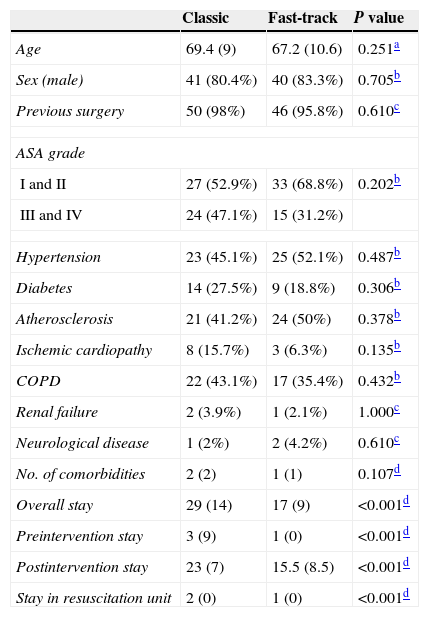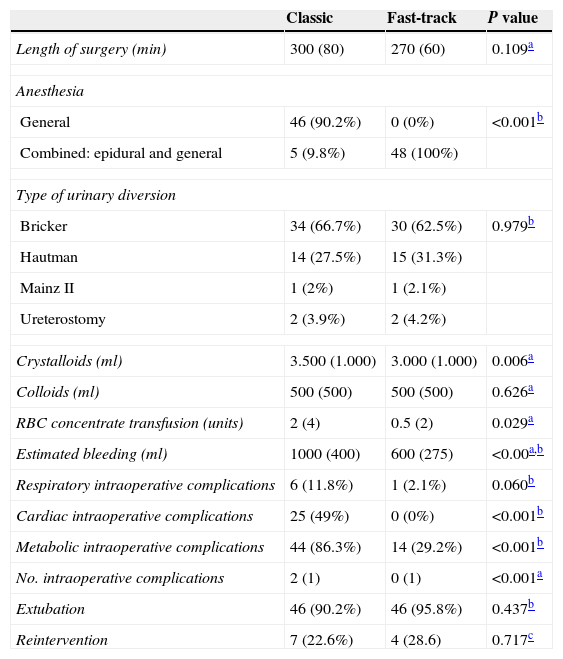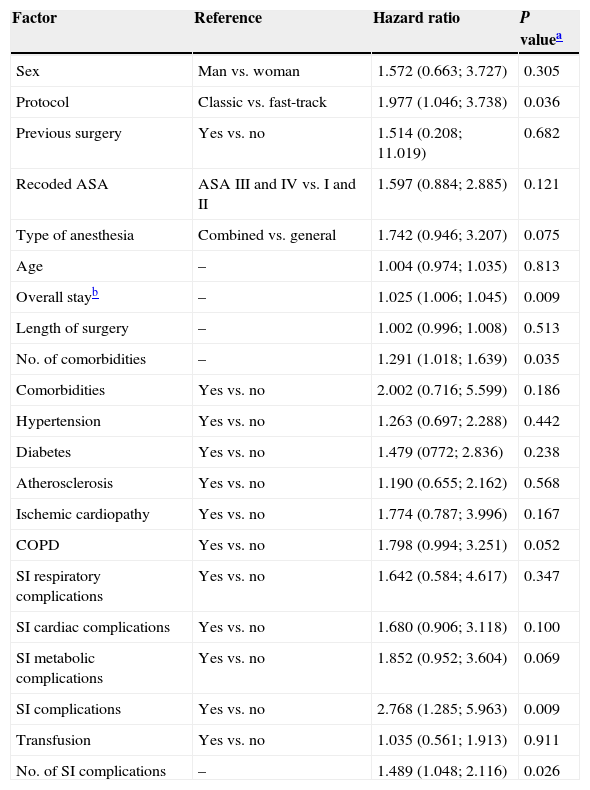Radical cystectomy (RC) is the urological procedure associated with the highest rates of morbidity, mortality and hospital stay. The implementation of fast-track programs seeks to speed postsurgical recovery. Its application to radical cystectomy has yielded positive results.
ObjectivesTo assess the results of the fast-track protocol in RC at our hospital, in terms of morbidity, mortality and hospital stay, comparing these results with those of patients who underwent RC following the classic protocol. To thereby ascertain whether the implementation of the fast-track protocol represents a reduced number and severity of complications and shorter hospital stays.
Material and methodsAmbispective cohort study of patients who underwent RC between January 2010 and October 2012 by either protocol (classic and fast-track). We analyzed the patient characteristics, intraoperative variables, postoperative complications (according to the Clavien classification), hospital stay and recovery stay.
ResultsNinety-nine patients were included, 51 following the classic protocol and 48 following the fast-track protocol. The groups were homogeneous. The hospital stay and recovery stay were longer in the classic group than in the fast-track group (29 and 2 days, respectively, vs. 17 and 1 day). There was less intraoperative bleeding in the fast track group (600mL) than in the traditional group (1000mL). Of the 99 patients, 31 (60.8%) of the classic group presented a postoperative complication, while the fast-track group had 14 (29.2%), most of which were minor (Clavien degrees 1 and 2). In the multivariate analysis, the type of protocol and the number of comorbidities were significant.
ConclusionsThe implementation of the fast-track protocol in RC was associated with a significant reduction in intraoperative and postoperative complications and hospital stay.
La cistectomía radical (CR) es el procedimiento urológico asociado a las tasas más altas de morbimortalidad y estancia hospitalaria. La aplicación de programas fast-track pretende acelerar la recuperación posquirúrgica y su aplicación en cistectomía radical ha reportado resultados positivos.
ObjetivosValorar los resultados del protocolo fast-track en CR en nuestro hospital, en términos de morbimortalidad y estancia hospitalaria, comparando dichos resultados con los de los pacientes intervenidos de CR siguiendo el protocolo clásico. Así, averiguar si la aplicación del protocolo fast-track supone una reducción del número y gravedad de complicaciones y una menor estancia hospitalaria.
Material y métodosEstudio de cohortes ambispectivo de pacientes intervenidos de CR, desde enero de 2010 a octubre de 2012, por ambos protocolos, tanto clásico como fast-track. Se analizan las características de los pacientes, las variables intraoperatorias, complicaciones postoperatorias (según clasificación Clavien) y estancia hospitalaria y en reanimación.
ResultadosSe incluyeron 99 pacientes, 51 siguiendo el protocolo clásico y 48 el protocolo fast-track, siendo grupos homogéneos. La estancia hospitalaria y en reanimación fue mayor en el grupo clásico que en el fast-track (29 y 2 días respectivamente frente a 17 y 1 días) Hubo menor sangrado intraoperatorio en el grupo fast-track (600ml) que en el clásico (1.000ml). De los 99 pacientes, 31 (60,8%) del grupo clásico presentaron alguna complicación postoperatoria mientras que en el fast-track fueron 14 (29,2%), la mayoría menores (grados 1 y 2 Clavien). En el análisis multivariado resultó significativo el tipo de protocolo y el número de comorbilidades.
ConclusionesLa implantación del protocolo fast-track en CR se asoció a una disminución significativa de complicaciones intra- y postoperatorias y de estancia hospitalaria.












